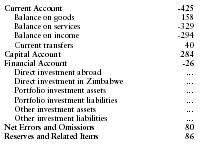Zimbabwe - Balance of payments
Zimbabwe's imports grew by an average of 11% between 1988 and 1998, reflecting a relaxation of import controls and the inflow of capital goods needed for investment, but declined rapidly after 1998. The rapid rise of the current account deficit since 1989 was caused primarily by the surge in imports from the creation of the Open General Import License (OGIL) list of items possible for importation without first obtaining a foreign exchange allocation from the government. With huge pent-up demand and future uncertainty about the program, importers rushed to take advantage of the opportunity, often hoarding several years' supply of items, which caused the trade deficit to balloon. After 1997, the amount of imports leveled off, and dropped rapidly in 1998. Due to the government's disastrous land reform programs, the commercial sector, as the traditional source of exports and foreign exchange, has suffered considerably.
The US Central Intelligence Agency (CIA) reports that in 2001 the purchasing power parity of Zimbabwe's exports was $2.1 billion while imports totaled $1.5 billion resulting in a trade surplus of $600 million.
The International Monetary Fund (IMF) reports that in 1998 Zimbabwe had exports of goods totaling $1.96 billion and imports totaling $1.8 billion. The services credit totaled $383 million and debit $712 million. The following table summarizes Zimbabwe's balance of payments as reported by the IMF for 1998 in millions of US dollars.

| Current Account | -425 |
| Balance on goods | 158 |
| Balance on services | -329 |
| Balance on income | -294 |
| Current transfers | 40 |
| Capital Account | 284 |
| Financial Account | -26 |
| Direct investment abroad | … |
| Direct investment in Zimbabwe | … |
| Portfolio investment assets | … |
| Portfolio investment liabilities | … |
| Other investment assets | … |
| Other investment liabilities | … |
| Net Errors and Omissions | 80 |
| Reserves and Related Items | 86 |
the is. is it economic policy implementation which is resulting in the zimbabwean economic situation fail to change as expcted by majority citizens. imports still surpass net exports.